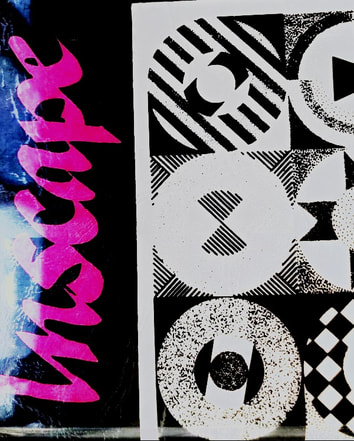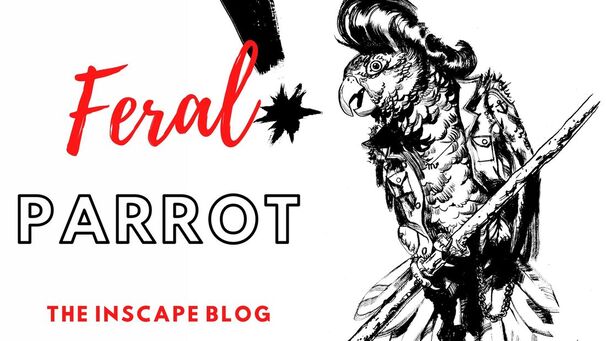- Folio No. 9
- About
- Feral Parrot : The Blog
- INTERVIEWS
- SUBMISSIONS
-
ISSUE ARCHIVE
- PRINT Chapbook No.6 Healing Arts
- Online Issue No.9
- Online Issue No.1 Fall 2016
- Online Issue No.2 Spring 2017
- ONLINE Issue No.3 Fall 2017
- PRINT Vol 72 No 2 Fall 2017
- PRINT Vol 73 No.1 Fall 2018
- ONLINE Issue No. 4 Fall 2018
- Online Issue No.5 Summer 2018
- FOLIO No.1 Fall 2018 VOTE
- ONLINE Issue No.6 Fall 2018 Fall Spirituality
- FOLIO 2 Fall 2019 Celebrating Dia De Los Muertos
- FOLIO No.3 -- Moon Moon Spring 2019
- FOLIO No.4 Celebrating New PCC Writers
- FOLIO No.5 City of Redemption
- FOLIO No.6 Spring 2020
- FOLIO No. 7 - Winter 2021 Into the Forest
- 2022 Handley Awards
- Inscape Alumni Board
- PRINT Chapbook No. 7 Healing Arts
- Blog
- Untitled
From The Inscape Archives, vol. 39, 1984 Edition: Debunking The Case of the Legwarmer Clad Sheep5/30/2018  by Becky Nava Our staff review their favorite issues from the Inscape Archives, available at Shatford Library, Pasadena City College (click here) Loud. Brash. Unapologetic. In an era of heightened ambition and skyscraper hair, the 80s also broke through ceilings at a high rate of expansion. In 1981, the invention of the first personal computer foreshadowed a society reconciling consumption with curiosity. Social change was in full swing as Sandra Day O’Conner was made the first woman justice in the Supreme Court, and Sally Ride became the first U.S. woman in outer space. Though notable, the achievements reflect a mentality driven by and for the individual. In contrast to the independent bravado perpetuated by an aloof denim-clad exterior, the works within the 1984 edition of Inscape invite a quirky vulnerability to the romantically detached world fed to us by pop culture. There is a glimpse beyond the Wolf of Wall Street world where fast money, cars, ideas take precedence, and in which firsts are more coveted than unification. A world set to the tune of Madonna's "Material Girl". “The Ferris Wheel”, a short story by Darla Joy Sancer, is a poignant instance of such an irreverent combination. It follows the woes and ideals of a disgruntled ferris wheel operator named Joe Grinnel, as he reflects on the changes to the amusement park, in particular the growing popularity of fast and glitzy rides, over traditional and quaint ones. On one hand, it’s staunchly political, drawing on the mal-effects of industrialization on a small town carnival worker. On the other, it toys with the bleak and monotonous realities of such a limited life. The piece is self-aware as hell, mocking capitalist culture by labelling the ferris wheel’s home “Famous Funland Amusement Park”, a blow to the generic superficiality of consumer taste and to the ominous corporate institutions that feed them (i.e. @Disney). In doing so, it aims to criticize the effects of consumerism on the psyche, as it promotes a flock mentality under the guise of individuality. In accord, the story’s wry humor swerves between playful and cynical, offering an amusingly horrific ending, in which a young couple is forced to ride what they presumed to be a ‘harmless’ ferris wheel over and over. The combination of psychological horror and political commentary make it as memorable as the decade itself. Equally eerie is David Tindall’s poem “13”, that captures another universal horror - growing up. In a mere five lines, it delivers the emotions of a coming of age tale, without the Caulfield angst. The theme of maturation is imbedded in the everyday details, like the mating of our protagonist Valerie’s pet parakeets. A seemingly simple, but intensely complex moment reads “she burnt her lips on her first cup of coffee”. The line is riddled with symbolic overtures, life is bittersweet, and if you live carelessly you’ll get burnt. One of Tindall’s most compelling rhetorical strategies revolves around the use of this tone, and its nostalgia, through a cynical lens. He takes moments, from the overlooked to the cliché, with a refreshing perspective that is both simple and didactic, yet still encroached with meaning. Another pivotal element of the piece is its satiric subtext. The poem pokes fun at the socially imposed idea that numerical quantity dictates wisdom, as seen by the fact that the day she turned 13 was also conveniently “the morning all hell broke loose”, as if the pages on a calendar literally saddled her with a newfound adult complexity. The poem also takes a hauntingly paternal perspective by expressing the fleetingness of both the present and childhood. The duality of this insight challenges the reader to "get existential" and contemplate the implications of time as a socially refined concept, while questioning the merit of its importance within our society. Also, offering a more relatable interpretation, he forces the reader to contend with the loss of innocence. Still, while pondering the meaning of innocence itself, offering a modern day two for one snippet of Blake’s "Songs of Innocence and of Experience". The overwrought, dichotomous tone of the issue comes to a head within the confines of Katherine M. Minges poem “Mudpies”. Minges describes the careful process by which she crafts a mudpie. This is an effort tinged in sadness, as she uses the pie as metaphor - a cathartic coping mechanism to deal with the loss of a lover. The dirt in the pie is comprised of her memories, as sweetly, but oh so sadly, she poses “If you were here, I’d give you half”, her humble offering a guise for the blinding devotion she harbors toward her lover, the pie a clear symbol for her tarnished feelings. This sense of intimacy is furthered in her imagery, as she conjures an almost childlike picture of her “cupped palms” clutching and packing the dirt together. The frailty of her innocence is noted when she juxtaposes the ugliness of a mud pie, and by extension the ugliness/rawness of her circumstance, with the choice to decorate it with a single daisy and “a pinch of dusty love”. Her choice in garnish is overwhelmingly delicate and sweet, but still tainted a touch, a playful rendering to show the ways in which love is experienced from youth. All of these works culminate into a collection that convey the human condition with authenticity, finding beauty and humor in the mundane, the horrors of everyday life, and the universal pangs of growth and dejection. The 1984 issue of Inscape is ripe with intent, exposing a generation riddled with doubt and frightened of vulnerability, all with a wry sense of humor which earn it a place on any bookshelf.
0 Comments
by Becky Nava
Love is perhaps the most universal emotion of our existence. Benjamin Kim appeals to that doting romantic in us all in his poem “Sonnet”. The speaker begins by highlighting the physical attributes that the object of his affection maintains, their “celestial beauty” and brown eyes. Then the poem goes on to praise their vivacious personality, “your laugh breathes life”, as if the giggles are capable of generating the conditions for our existence. Yet it is in these comparisons that the speaker’s notions of love transcend the bounds of corporeality and confines of time to depict a more timeless love between two souls. He connects our most "universal" emotion to metaphors of the universe itself. This is where the main source of beauty behind the poem lies for me, in his illustrious comparisons to the celestial and galactic. Herein the speaker is self-aware, noting that other poet’s may focus their attention on the romantics of the moon and all of its illusiveness. Though to combat the cliche of this ideology, he cleverly states, "for the moon most certainly writes for you", as if to say that all other poets have missed out on the true beauty of the galaxy by writing about the moon! The speaker’s use of color as a means of description supports the celestial background he works to concoct. By referencing a wide array of colors throughout the poem, he mimics the ever changing sea of colors found in the stars and planets. This impression is furthered in the lines, The blue sky rushes to pink at high noon For the sunset bleeds each day to please you Kim plays with manmade concepts by showing the evolving colors as a means of highlighting how the time of day is connected to his inner world of emotions, ultimately portraying a soul with a universe of its own. “Sonnet”’s romantic depiction of the galaxy is ultimately effective as a means to describe his adoration as timeless. Furthermore, it illustrates the grander comment on a bond between on souls overpowering notions of space and time. Benjamin Kim's "Sonnet" appears in the Fall 2017 issue of Inscape magazine. by Giselle De Silva
I couldn’t turn away when I heard my own thoughts being relayed by someone else. How can you when it sounds like someone has read your personal writing and shared it with the world without your consent...but in more moving words, and more eloquently? This is what I experienced when I read Consuelo Martinez’s "Advice I Would Give To The Girl I Was Before. Martinez explores the painful bumps of youth in topics like childhood bullying, failed romances, body acceptance, and the pain behind saying goodbye amongst many key moments in her life. Her execution of this exploration is not self-indulgent, rather poignant, self-reflective, and personal without a doubt. My favorite writers make me feel as if I’m not alone in my own personal battles. They validate my existence and struggles when I cannot do so for myself. This is largely the effect that attracted me to Consuelo and this piece. She writes: "when the kids in school tease you for your name, do not shorten it, do not assimilate to a culture that took yours to begin with...” My full name is Giselle Mariel Boongaling De Silva. Growing up, I was rather ashamed of its entirety because of its length (all 30 letters would hardly ever fit on the line where you write your name) and how “ethnic” it sounds when you say it out loud. I still hold similar reservations against my full name to this day, though time has conditioned me to forget this. In reading Consuelo’s advice on the matter, it reminded me that I shouldn’t be either ashamed nor afraid of my name. It is a piece of my identity and it denotes my history. This poem, although written for herself, translates easily into courage for me. Admittedly, I am biased, because like Consuelo, I too am a woman of color with "bushy eyebrows" and "hopelessly in love with anybody I ever meet". However, there’s something ethereal, that still packs a punch, in the universal way she talks about getting back up and standing your ground in every moment of defeat. Consuelo Martinez's "Advice To The Girl I Was Before" can be read in entirety in the Fall 2017 Issue of Inscape magazine. |
IMPORTANT NOTE:
PCC Inscape Magazine, housed at Pasadena City College, is following Coronavirus protocols. At this time our staff continues to read submissions and publish web content. Note:
Blog Posts reflect the opinions of the writer and not the opinions of Pasadena City College or Inscape Magazine Editorial Staff Members. Archives
December 2023
Categories
All
|


 RSS Feed
RSS Feed